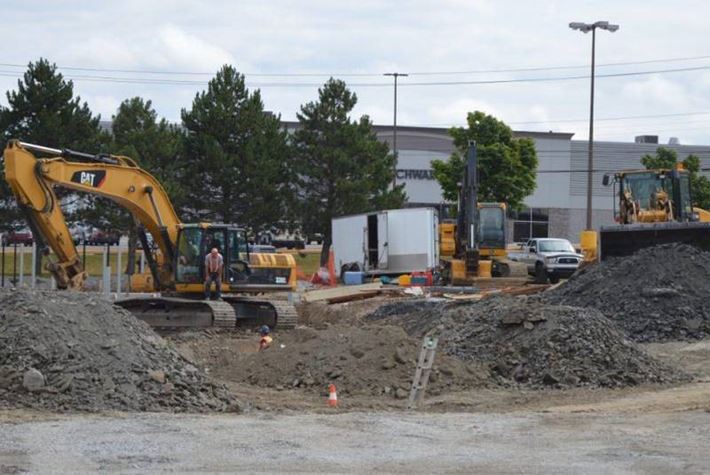Taxes. We all hate them, and we all need them.
At the end of the day, regardless of your politics... you have to acknowledge their necessity. A left wing NDPer and a right-wing Conservative have one thing in common - both require a large source of tax revenue to govern the way they see fit. Our municipality, the CBRM, is no different. The city provides waste disposal, fire fighting, police, all sorts of safety inspections, water, community halls, road repair... several decades of waterfront development... snow removal, etc.
So how do we pay for all that?
Well, some of it is paid for by fees and permits - hall rentals, building permits, business fees, etc. Some of it is paid for by the transfer from the provincial government (a huge source of local controversy that I encourage you to come out and discuss with everybody tomorrow night).
The rest of it comes from property taxes on business and homes: a little over 103 million dollars worth in 2016/17. Now, I find property tax really interesting (have I mentioned I'm a gigantic nerd?) but for those who do not, it is basically when you pay a portion of the value of your property every year to the municipal government as a form of tax.
There's two main problems with our property tax: the first and most obvious being that it is killing business in our towns. Businesses pay more than twice as much as everybody else in the CBRM, and they pay more when they're "downtown". This has resulted in a downward spiral: businesses pay so much in property taxes that, combined with the poor local economy, a few of them go bankrupt (or move away). This means the value of their business (their property) goes down... which means the CBRM has less tax money to work with.
What does the CBRM do to make up this gap? Well, its not politically popular to raise taxes on people's homes too much, and it's not politically popular to cut spending on critical services like police or snow removal... so we hike up business taxes again, restarting the whole damaging cycle. Every year that goes by the economy gets worse, and taxes get higher. How can business survive, let alone thrive and grow?
The second problem is less obvious, but just as sinister - our property taxes punish our successful businesses. Let's say you're a really successful Cape Breton company - so successful that you need to build a HUGE extension on your property. How does the CBRM reward you for your contributions to the community? Simple: we charge you more taxes. You see, your business built that beautiful new extension, which increased the value of your property, so... pay up! Oh, and thanks for the jobs, please don't leave!
This doesn't just apply to businesses (although they have it worse than anybody) - if you improve your home, you can expect a higher tax bill as a reward. Built a new garage? Expect some new taxes too. Want to rent out your basement apartment for a little extra cash? You're giving some of that to the city my friend!
Well that all sounds pretty terrible... but what can we do about it? We NEED taxes, right?
We do - especially if we want extremely expensive services like the police or snow removal. Luckily, there's another way to collect taxes like this, and it's not a lot different from how we do it now. It's called the Land Value Tax (we policy dorks call it the LVT for short) and it might be just what the doctor... would have ordered, if they hadn't shut down the hospital.
It's used in some of the most crammed cities and countries on earth (Hong Kong, Singapore) to ensure what little land they have is used productively... and it's also used in many post-industrial cities and towns (not unlike the CBRM) all over the world, for the reasons I outline below.
What is it? Well, a property tax is a tax on the value of your property - the land it sits on, the buildings on it, the neighborhood it sits in, everything. A land value tax is when we collect the same amount of tax, but solely on the value of the land your property sits on. Basically, its a tax on the value of land as though it didn't have anything on it.
Why would this be better? That's almost the same thing, isn't it?
Almost - but not quite. If you build a garage, you've increased your property's value, which increases your property taxes. But if you pay an LVT instead... nothing changes. Your land will still be worth more or less the same value, and you'll therefore pay more or less the same taxes.
So when you start to think about it... it makes a HUGE difference. Instead of punishing success, a land value tax punishes... doing nothing. Under the current property tax system, low-value landlords (aka "slumlords") who don't fix up their property actually get a discount - their property isn't worth much, so they pay less tax. Under a land value tax system, "slumlords" have to pay the same amount as every other landlord in their area. Since you can't change as much rent for a "slum"... landlords actually have an incentive to make their properties nicer. Making a property nicer requires buying things... which improves the local economy. Sounds like something we could use, eh?
Have you ever driven around and noticed all the empty/derelict plots of land in our towns? Well, under our current tax system, the landlords of these properties don't really have any incentive to DO anything with them. They're not worth much, they don't cost a lot every year in terms of property taxes... so their owners wait, hoping that property values go up and they can sell the land for more money. This is known as land speculation - and its a far from ideal situation for the CBRM, which desperately needs productive economic activity, yet it is extremely common.
But under a land value tax? Well, those empty plots of land suddenly cost a lot more - instead of the tax burden being placed on the entire property, only the land is taxed - meaning empty plots of land are, all of a sudden, expensive. The owners will either have to try to use the land to make money by, say, building businesses or homes (something we desperately need more of) or they'll sell the land for cheap to someone who will.
Sounds too good to be true. What's the catch? Well... the value of empty land will probably go down, by a lot. Been holding on to an empty/rundown plot of land for a few years? Well, a land value tax will cause its value to drop, to the point where you'll want to either use it or sell it. This means that the "enemies" of this tax tend to be very large landowners, especially those who own a lot of empty or extremely low-value (those "slumlords" again) properties. However, its a booster shot for the productive homes and especially businesses of the local economy - because improving your property doesn't cost you more in taxes.
Would this fix all of our problems? No... but taxes stink, and this one has a decidedly better smell.
Cape Breton: Taxed to Sleep (And How We Wake Up)
Posted by
Ryan Campbell
Receive news by email and share your news and events for free on goCapeBreton.com
SHOW ME HOW
https://capebreton.lokol.me/cape-breton-taxed-to-death
Gov Political Commentary
View all the LATEST
and HOTTEST posts
and HOTTEST posts






10
Log In or Sign Up to add a comment.- 1
arrow-eseek-e1 - 6 of 6 itemsFacebook Comments